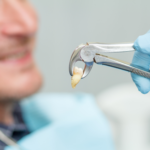We often think of stress as a purely mental or emotional issue, but did you know it can also have a significant impact on your physical health, including your teeth and gums? When you’re under stress, your body undergoes changes that can directly affect your oral health. Let’s explore how stress can affect your teeth and gums and what you can do to mitigate its effects.
How Stress Impacts Your Oral Health
- Weakened Immune System: Stress can compromise your immune system, making you more susceptible to infections, including gum disease.
- Bruxism (Teeth Grinding): When you’re stressed, you may unconsciously grind your teeth at night, leading to enamel erosion and jaw pain.
- Clenching: Clenching your teeth can also put excessive strain on your jaw joints and muscles, causing discomfort and potential damage.
- Poor Oral Hygiene: Stress can lead to neglect of oral hygiene practices, such as skipping brushing or flossing, which can contribute to tooth decay and gum disease.
Signs of Stress-Related Oral Health Issues
- Sensitive Teeth
- Jaw Pain or Stiffness
- Receding Gums
- Bad Breath
- Toothaches
Managing Stress for Better Oral Health
- Practice Stress Management Techniques: Incorporate relaxation techniques like meditation, deep breathing, or yoga into your daily routine.
- Get Enough Sleep: Aim for 7-9 hours of quality sleep each night to help your body recover and reduce stress.
- Regular Exercise: Physical activity can help alleviate stress and improve overall health.
- Healthy Diet: A balanced diet provides essential nutrients to support your oral health and reduce stress.
- Professional Dental Care: Regular dental check-ups and cleanings can help identify and address potential oral health problems related to stress.
By understanding the connection between stress and oral health, you can take proactive steps to protect your smile and improve your overall well-being. If you notice any signs of stress-related oral health issues, consult with your dentist for appropriate treatment.








